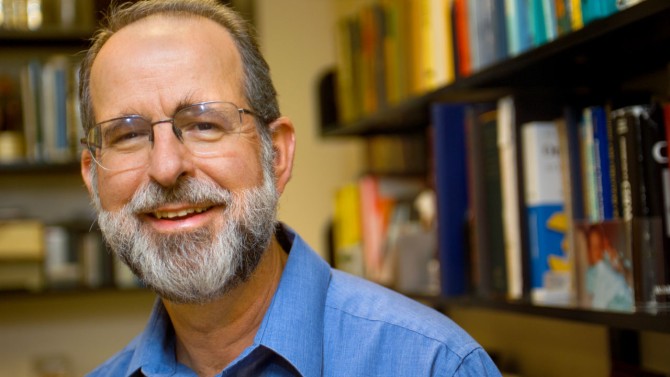Frank DiSalvo, Cornell Atkinson’s first director, dies at 79
By Blaine Friedlander, Cornell Chronicle
Francis “Frank” J. DiSalvo, a chemist-physicist who inspired hundreds of Cornellians from different disciplines to collaborate on environmental problems, died on Oct. 27 in Atlanta, Georgia. He was 79.
An accomplished scientist whose work ranged across chemistry, physics, materials science and energy, DiSalvo studied the synthesis of solid-state materials and the physicochemical phenomena in such solids, which enabled advances in fuel cell and battery technologies.
“The physicist turned out to be a better chemist than most of us, with the solid-state equivalent of a green thumb for making new materials. Frank DiSalvo was also our favorite colleague,” said Nobel laureate Roald Hoffmann, the Frank H.T. Rhodes Professor Emeritus in the Department of Chemistry and Chemical Biology in the College of Arts and Sciences. “His talent for putting human beings at ease was infectious – it was always upbeat to be with him. We miss him.”
DiSalvo, the John A. Newman Professor Emeritus of Physical Science in the Department of Chemistry and Chemical Biology (A&S), is perhaps best known at Cornell for initiating and directing what is now the Cornell Atkinson Center for Sustainability.
“As founding director, Frank built programs and processes that set Cornell Atkinson on a trajectory for success. He was inspirational, inclusive and deeply committed to sustainability,” said David M. Lodge, the Francis J. DiSalvo Director at Cornell Atkinson. “His penchant for exchanging ideas and passion to address complex global challenges drew many to the university. He lit a path for so many to follow and I feel lucky to have been a friend, a colleague and his successor here at the center.”
DiSalvo was born July 20, 1944, in Montreal, Quebec, the oldest of seven children. The family moved to Reading, Massachusetts during his childhood.
He earned his B.S. in physics from the Massachusetts Institute of Technology in 1966 and his doctorate in applied physics from Stanford University in 1971.
He joined the scientific research staff in 1971 at AT&T Bell Laboratories, where he later headed several research departments.
“I had one technician and a small lab,” DiSalvo said in a video interview with Héctor Abruña, the Emile M. Chamot Professor in Chemistry and Chemical Biology (A&S), which was recorded in 2012. “To accomplish almost anything, you had to collaborate and that’s where I really learned the power of collaboration and talking to people in other disciplines who know things that you don’t.”
In 1986, DiSalvo was recruited to join the Cornell faculty.
From 2000 to 2005, DiSalvo served as director of the Cornell Center for Materials Research, funded by the National Science Foundation. And in 2003, with Abruña, he helped to establish the Cornell Fuel Cell Institute, which was supported by the U.S. Department of Energy.
“Frank was an individual of exceptional talent and even greater generosity,” said Abruña, who collaborated with DiSalvo for three decades. “While he left us, probably to go fishing up in heaven, he will live forever in our hearts and minds.”
In 2007, then-Provost Biddy Martin formed a task force to create a cohesive, universitywide plan to solve climate problems, installing DiSalvo as chair. He delivered to Martin a report within six weeks and soon the Cornell Center for a Sustainable Future was born. He served as the center’s interim director, starting in 2007.
In the center’s first five years, DiSalvo became the permanent director, growing the list of Cornell faculty fellows to 315 from 65 university departments. It is now the Cornell Atkinson Center for Sustainability, with more than 670 faculty fellows. The directorship was named in his honor by David R. Atkinson '60 and Patricia D. Atkinson in 2013.
DiSalvo published more than 500 scientific articles and held 12 patents. In 1991, he was awarded the American Physical Society International Prize for New Materials and elected to the National Academy of Sciences. He was a fellow of the American Academy of Arts and Sciences, the American Association for the Advancement of Science, the American Physical Society and the Materials Research Society.
“So many in the Cornell community will miss Frank DiSalvo. He was a groundbreaking researcher, who was a true leader in the area of solid-state chemistry. But more than that, Frank worked tirelessly to advance science beyond the bounds of his own discipline. He collaborated broadly and was a guru in the general areas of material science, energy conversion and sustainability,” said Brian Crane, the George W. and Grace L. Todd Professor in Chemistry and Chemical Biology and interim senior associate dean (A&S).
“Frank could relate to anyone and as a result connected with students at all stages and from many backgrounds,” Crane said. “He was eternally optimistic, enthusiastic and an ambassador for living a life of curiosity and reason.”
DiSalvo is survived by his wife, Barbara DiSalvo, two daughters and four grandchildren.
Media Contact
Get Cornell news delivered right to your inbox.
Subscribe

